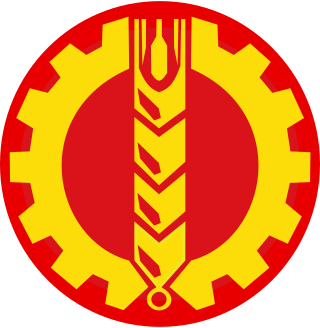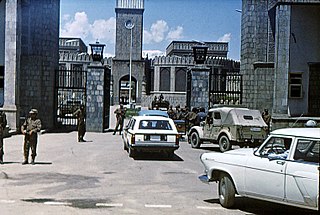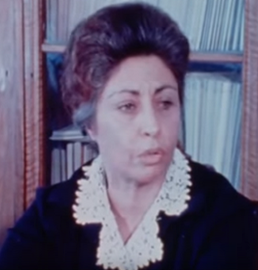
Najibullah Ahmadzai ; February 1947 – 27 September 1996), commonly known as Najibullah or Dr. Najib, was the President of Afghanistan from 1987 until 1992, when the mujahideen took over Kabul. He had previously held different careers under the People's Democratic Party of Afghanistan (PDPA) and was a graduate of Kabul University. Following the Saur Revolution and the establishment of the Democratic Republic of Afghanistan, Najibullah was a low profile bureaucrat: he was sent into exile as Ambassador to Iran during Hafizullah Amin's rise to power. He returned to Afghanistan following the Soviet intervention which toppled Amin's rule and placed Babrak Karmal as head of state, party and government. During Karmal's rule, Najibullah became head of the KHAD, the Afghan equivalent of the Soviet KGB. He was a member of the Parcham faction led by Karmal.

The Democratic Republic of Afghanistan, renamed in 1987 to the Republic of Afghanistan, commonly known as Afghanistan, existed from 1978 to 1992, during which time the socialist People's Democratic Party of Afghanistan (PDPA) ruled Afghanistan.

The People's Democratic Party of Afghanistan was a political party established on 1 January 1965. While a minority, the party helped former prime minister of Afghanistan, Mohammed Daoud Khan, to overthrow King Mohammed Zahir Shah in 1973, and establish the Republic of Afghanistan. Daoud would eventually become a strong opponent of the party, firing PDPA politicians from high-ranking jobs in the government cabinet. This would lead to uneasy relations with the Soviet Union.

Nur Muhammad Taraki was an Afghan communist statesman during the Cold War who served as President of Afghanistan from 1978 to 1979. Taraki was born near Kabul and educated at Kabul University, after which he started his political career as a journalist. He later became one of the founding members of the People's Democratic Party of Afghanistan (PDPA) and was elected as the party's general secretary at its first congress. He ran as a candidate in the 1965 Afghan parliamentary election but failed to secure himself a seat. In 1966 he published the first issue of Khalq, a party newspaper, but it was closed down shortly afterwards by the government. He led the Khalq wing of the PDPA. In 1978 Taraki, along with Hafizullah Amin and Babrak Karmal initiated the Saur Revolution and established the Democratic Republic of Afghanistan.
Sultan Ali Keshtmand, sometimes transliterated Kishtmand, born May 22, 1935, in Kabul, was an Afghan politician. He served twice as Chairman of the Council of Ministers during the 1980s, from 1981 to 1988 and from 1989 to 1990 in the Democratic Republic of Afghanistan.

This article gives information on elections in Afghanistan.

Khalq was a faction of the People's Democratic Party of Afghanistan (PDPA). Its historical leaders were Presidents Nur Muhammad Taraki and Hafizullah Amin. It was also the name of the leftist newspaper produced by the same movement. It was supported by the USSR and was formed in 1965 when the PDPA was born. The Khalqist wing of the party was made up primarily of Pashtuns from non-elite classes. However, their Marxism was often a vehicle for tribal resentments. Bitter resentment between the Khalq and Parcham factions eventually led to the failure of the Democratic Republic of Afghanistan government that was formed as a result of the Saur Revolution in 1978. It was also responsible for the radical reforms and brutal dissident crackdowns that encouraged the rebellion of the religious segments present in the Afghan society, which led to the creation of the Mujahideen and, eventually, to the Soviet military intervention in December 1979.

The Politburo of the Central Committee of the People's Democratic Party of Afghanistan (PDPA), Afghan Politburo, was the policy-making organ and institution within the Afghanistan's political structure when the PDPA Central Committee and the PDPA Congress were not in session. Only one politburos was formally elected; at the 1st Congress, despite this, the membership line-up was altered numerous times during the PDPA's existence.

Colonel Abdul Qadir was born in Herat and trained as a pilot in the Soviet Union. In 1973 he also participated in the coup d'etat that created the Republic of Afghanistan under the Presidency of Mohammad Daoud Khan. In 1978 he was the leader of the Afghan Air Force squadrons that attacked the Radio-TV station during the Saur Revolution. He served as the leader of the country for three days when the People's Democratic Party of Afghanistan (PDPA) took power and declared the foundation of the Democratic Republic of Afghanistan.

The Saur Revolution, also called the April Revolution or April Coup, was a coup d'état led by the People's Democratic Party of Afghanistan (PDPA) against the rule of Afghan President Mohammed Daoud Khan on 27–28 April 1978. Daoud Khan and most of his family were killed at the presidential palace. The revolution resulted in the creation of a government with Nur Muhammad Taraki as President, and was the precursor to the 1979 intervention by the Soviets and the 1979–1989 Soviet–Afghan War against the Mujahideen.
The following lists events that happened during 1978 in Afghanistan.
The following lists events that happened during 1979 in Afghanistan.

The Democratic Republic of Afghanistan was the government of Afghanistan between 1978 and 1992 recognised by 8 countries. It was both ideologically close to and economically dependent on the Soviet Union, and was a major belligerent of the Afghan Civil War.
Ghulam Dastagir Panjsheri born in 1933 in Panjshir, Afghanistan. Panjsheri was usually identified as a Khalq by fellow Afghan politicians, while outside observers said he was creating his own PDPA group under the name Gruhi Kar.
Mir Akbar Khyber was an Afghan left-wing intellectual and a leader of the Parcham faction of People's Democratic Party of Afghanistan (PDPA). His assassination led to the overthrow of Mohammed Daoud Khan's republic, and to the advent of a socialist regime in Afghanistan, the Democratic Republic of Afghanistan.

The Revolutionary Council of the People's Democratic Party of Afghanistan (PDPA) ruled the Democratic Republic of Afghanistan from 1978 until its collapse in 1992. The council was the supreme state power under the communist regime and was a carbon copy of the Supreme Soviet. The point with the council was to convene on a semiannual basis to approve decisions made by the presidium.

Anahita Ratebzad was an Afghan socialist and Marxist politician and a member of the People's Democratic Party of Afghanistan (PDPA) and the Revolutionary Council under the leadership of Babrak Karmal. Ratebzad was Afghanistan's deputy head of state from 1980 to 1986.

Elections were held in Afghanistan in September, 1965. Women voted for the first time in Afghan elections. The election took place using the single-member plurality electoral system.
















